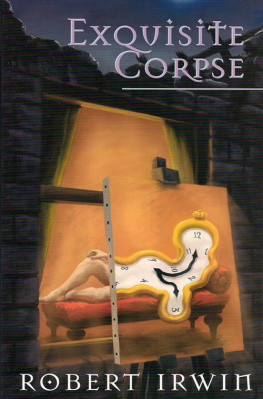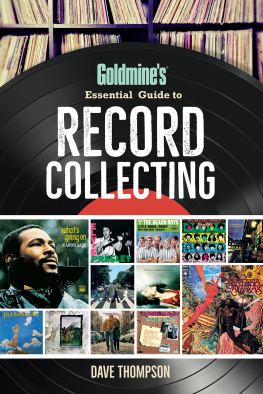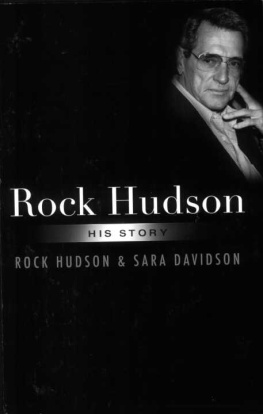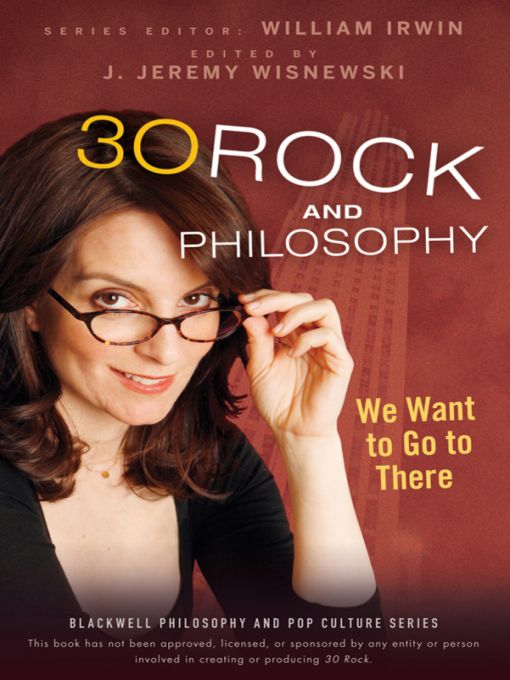Table of Contents
The Blackwell Philosophy and Pop Culture Series
Series Editor: William Irwin
South Park and Philosophy
Edited by Robert Arp
Metallica and Philosophy
Edited by William Irwin
Family Guy and Philosophy
Edited by J. Jeremy Wisnewski
The Daily Show and Philosophy
Edited by Jason Holt
Lost and Philosophy
Edited by Sharon Kaye
24 and Philosophy
Edited by Richard Davis, Jennifer Hart Weed, and Ronald Weed
Battlestar Galactica and Philosophy
Edited by Jason T. Eberl
The Office and Philosophy
Edited by J. Jeremy Wisnewski
Batman and Philosophy
Edited by Mark D. White and Robert Arp
House and Philosophy
Edited by Henry Jacoby
Watchman and Philosophy
Edited by Mark D. White
X-Men and Philosophy
Edited by Rebecca Housel and J. Jeremy Wisnewski
Terminator and Philosophy
Edited by Richard Brown and Kevin Decker
Heroes and Philosophy
Edited by David Kyle Johnson
Twilight and Philosophy
Edited by Rebecca Housel and J. Jeremy Wisnewski
Final Fantasy and Philosophy
Edited by Jason P. Blahuta and Michel S. Beaulieu
Iron Man and Philosophy
Edited by Mark D. White
Alice in Wonderland and Philosophy
Edited by Richard Brian Davis
True Blood and Philosophy
Edited by George Dunn and Rebecca Housel
Mad Men and Philosophy
Edited by Rod Carveth and James South
To pages everywhere...
ACKNOWLEDGMENTS
Thanks for Helping Us Go to There
Television saves lives. It jumps into the lake to rescue small children, it lands aircraft in danger of crashing, it prevents natural disasters.
Okay, Im exaggerating. But I want to thank television nonetheless. While it hasnt ended war or famine, it has provided a constant source of entertainment, and a constant occasion to bring philosophy to bear on everyday life. And for that, I cant help but be grateful.
Im also grateful to all those folks who helped make this book possible. Ive been fortunate enough to work with contributors who didnt require all of the coddling that the cast of TGS with Tracy Jordan needs. Thanks for getting us there, everybody! Im also grateful to Connie Santisteban and Bill Irwineditors who make working on topics in philosophy and pop culture as fun as it should be. Justine Gray, Nicolas Michaud, and Jackie Seamon also deserve thanks for offering feedback on the manuscript, helping open Franks Hat Store (see Appendix 1), and collecting the wisdom of Kenneth Ellen Parcell (see Appendix 2).
Finally, Id like to thank my wife, Dorothy Wisnewski, for the support that makes it possible for me to do everything I do. Id also like to thank my children, Audrey and Lucian, for being as wonderful as they are.
INTRODUCTION
Platonic Fantasies and Tina Fey-losophy
I enjoy fantasies. Not the kind you see in movies, or read about in booksthe kind in my head. Since 30 Rock debuted, Ive found myself fantasizing about who the writers on the show might be. Would Plato fit in among the crowd, or Aristotle? Would Tina Fey hold her own, third-wave feminist style, against Socrates?
Aside from the small matter of being 2,400 years in the past, I can easily imagine Plato at the writers table, lizzing away with Tina Fey as they talk through the latest script. Plato was a notorious jokester. His dialogues include jokes about self-importance (Tracy and Jenna, anyone?), jokes about incompetence (Tracy and Jenna again? Devon Banks? Kathy Geiss?), and jokes about sex (have you seen the show!?). I think hed fit right in, at least once he learned English. I can even picture his hat: Socrates Rules.
Does it seem like a bit much? Is it surprising that television can be a source for philosophical reflection? Can real philosophy be done in conjunction with something popular, like 30 Rock? In asking these questions, wed do well to remember that Plato said truth could not be written, and that he himself had never written down his own philosophical teachings. (Im pretty sure Tina Fey said the same thing in some interview somewhere.) In this respect, all of Platos dialogues can be regarded as popular writings encouraging people to come to Platos Academy and to engage in living philosophical dialogue. The written dialogues are meant to begin the philosophical journey, not to end it. They are meant to inspire philosophical dialogue, not to replace it. This is exactly how I think of 30 Rock, and exactly what brings me back week after week.
When I think of philosophy and 30 Rock, I like to imagine Plato as a television writer. Plato used a popular medium of his time, the dialogue, to get people to philosophize. And I bet he would have opted for television if he lived in this century. Yes, Plato criticized imitation. Television is of course imitationand 30 Rock especially soits a show that imitates a show. Of course, Platos criticism of imitation occurs in a speech given by Socrates. The speech recounts a fictional dialogue. Plato was certainly aware that a speech about a dialogue was only an imitation of a dialogue, much as Tina Fey is aware that TGS isnt a real show. One cant help but imagine Plato smiling about what hed done. If he were a television writer, wed expect no less: he would surely criticize the crap thats on television in whatever show he was writing.
And yes, I like to think of Tina Fey and the writers of 30 Rock as a collective modern-day Plato (I said I enjoyed fantasy!). They put in just enough shenanigans (to use a little Irish slang) to keep viewers entranced. What does it mean to be black or white? What does it mean to live the good life? Should moral rules always be followed? Can Frank really be gay for just one guy? What is the nature of friendship? How can we know anything at all about the world? These questions arise on the set of TGSand they persist.
Kenneth says he loves two things: everybody and television. While I cant honestly say I love everyone, I concur wholeheartedly with Kenneth on television. It is a glorious invention, and a remarkable source of wonder. Where else can we view worlds that do not exist, full of quirky characters, doing endlessly amusing things? Where else can we find Tracy Jordon calling Colorado a white myth, Jack Donaghy admitting that he has a cookie jar collection, and Liz Lemon flashing a breast? And when we get to a television show about a television show, well, thats nearly too good to be true.
Aristotle claimed that philosophy begins in wonder, so its no surprise that philosophy can arise from watching televisionespecially when the show is about television, and full of some of the silliest stuff imaginable. Wonder is one of the benefits of watching 30 Rock, and philosophy cant help but be there too, bubbling up and spilling over everything.
NOTES
Many of Platos early dialogues poke fun at both incompetence and self-importance. Euthyphro, for example, is about a fellow who thinks he knows what morality is, and even claims to be able to see the future. Of course, the future he sees involves Socrates being acquitted at his trialwhich obviously is















